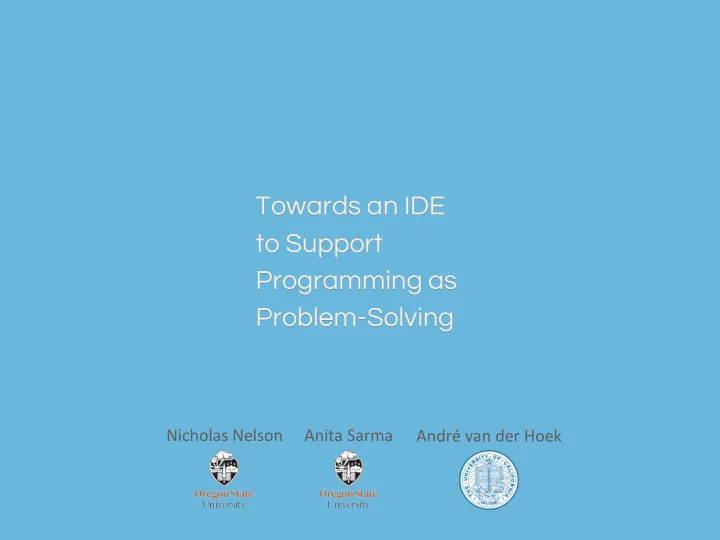

Towards an IDE Towards an IDE to Support to Support Programming as Programming as Problem-Solving Problem-Solving Nicholas Nelson Anita Sarma André van der Hoek
Programming is more than dealing with language syntax and semantics: it is inherently an exercise in problem-solving that extends beyond the act of editing code. 02 Section 1 Programming as Problem-Solving
Activities and Actions of Programming as Problem-Solving Understanding the situation Enacting change A1 Identifying goals A4 Translating strategies to actions Recalling prior knowledge Tracking progress Constructing models Evaluating and assessing change Filling knowledge gaps Collaborate Externalizing thoughts & ideas A5 Feedback solicitation A2 Representing relevant information Team work Contextualizing information Group think Preserving contextual information Leverage group knowledge Synchronization Developing strategies Retrospect A3 A6 Generating alternatives Reflect on work Articulating and refining alternatives Preserve work Understanding and assessing alternatives Recombining aspects of alternatives 03 Section 1 Programming as Problem-Solving
Understanding the situation A1 Challenges: How to support programmers’ formulation of problems and reflection on potential solutions? How to support programmers in relying upon past experience? 04 Section 2 Toward A New IDE
Externaling thoughts & ideas A2 Challenges: How to support programmers in relying upon past experience? How to utilize different pieces of information and context to support the act of coding? 05 Section 2 Toward A New IDE
Developing strategies A3 Challenges: How to support different information processing styles and workflows of programmers? How to utilize different pieces of information and context to support the act of coding? 06 Section 2 Toward A New IDE
PPIG 2017 07 Section 2 Toward A New IDE
Enacting change A4 Challenges: How to utilize different pieces of information and context to support the act of coding? 08 Section 2 Toward A New IDE
Collaborate A5 Challenges: How to enable collaboration between programmers across all artifacts involved in problem solving? 09 Section 2 Toward A New IDE
Retrospect A6 Challenges: How to support programmers in relying upon past experience? How to provide programmers access to the relevant context in a problem space? How to support different information processing styles and workflows of programmers? 10 Section 2 Toward A New IDE
Retrospect A6 Challenges: How to support programmers in relying upon past experience? How to provide programmers access to the relevant context in a problem space? 11 Section 2 Toward A New IDE
Challenges to introducing problem solving in programming to IDE design How to support programmers’ formulation of problems and reflection on potential solutions? 1 2 How to provide programmers access to the relevant context in a problem space? 3 How to support different information processing styles and workflows of programmers? 4 How to support programmers in relying on past experience? 5 How to enable collaboration between programmers across all artifacts involved in problem solving? Challenges How to utilize different pieces of information and context to support the act of coding? 6 12 Section 2 Toward A New IDE
Questions for the audience. Q Programming Does the open-ended and free-form interaction paradigm make sense? Q1 as Q2 Are cards the best metaphor for problem solving? Q3 Do cards with information on many faces help or hinder? Problem Solving Q4 Do cards with different media types make sense? 13 Section 3 The Next Step
Recommend
More recommend